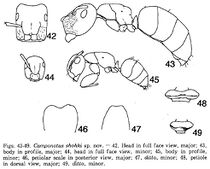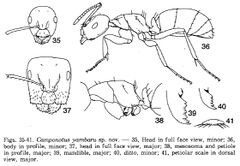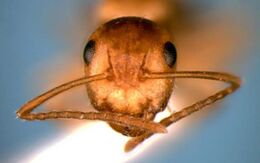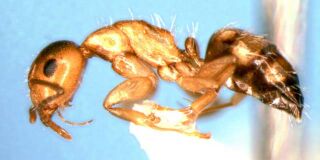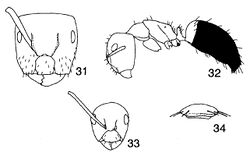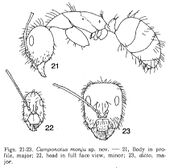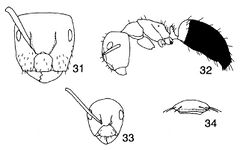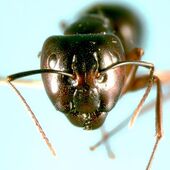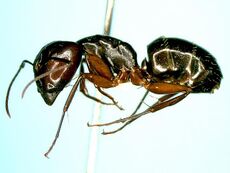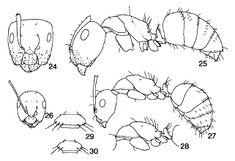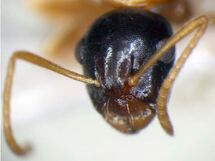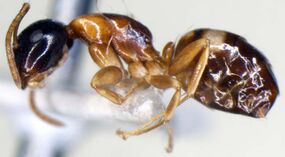Key to Camponotus of Japan
This worker key is based on: Terayama, M. 1999b. The ant genus Camponotus Mayr (Hymenoptera: Formicidae) in Japan. Memoirs of the Myrmecological Society of Japan. 1:25-48.
This key is dated. It does not include additions to the fauna after 1999 and a few species have been transferred to the genus Colobopsis.
You may also be interested in
1
- Heads of major workers with an anterior, flat truncated portion. In minor workers, the fore femur remarkably broad, and the posterior corner of the propodeum approximately right-angled in profile . . . . . 2
- Heads of major workers without a truncated anterior portion. In minor workers, the fore femur always less broad, if expanded at all; posterior corner of propodeum obtusely angled in profile (with a few exceptions) . . . . . 3
2
return to couplet #1
- In full face view, the upper, short part of the clypeus produced anteriorly on each side to form a small median process . . . . . Colobopsis nipponica
- In full face view, the upper, short part of clypeus with nearly straight anterior margin, not produced on each side, the median process very small . . . . . Colobopsis shohki
3
return to couplet #1
- Body yellow to yellowish brown (head slightly darker in majors) . . . . . Camponotus yambaru
- Body color not wholly yellow to yellowish brown . . . . . 4
4
return to couplet #3
- Mesothorax and propodeum red to yellow . . . . . 5
- Mesothorax and propodeum dark brown to black . . . . . 13
5
return to couplet #4
- First and 2nd gastral segments wholly reddish brown . . . . . Camponotus kaguya
- First and 2nd gastral segments not wholly reddish brown . . . . . 6
6
return to couplet #5
- Second gastral tergite with a pair of pale-coloured spots or a pale band . . . . . 7
- Second to 5th gastral tergites concolorous, without spots or bands . . . . . 9
7
return to couplet #6
- First to 3rd or 4th gastral tergites each with a pair of pale spots or a wide pale band . . . . . Camponotus ogasawarensis
- First and 2nd gastral tergites each with a pair of yellow spots (those on 1st tergite often fused together); such markings absent from 3rd and 4th tergites . . . . . 8
8
return to couplet #7
- Anterior margin of clypeus almost straight or weakly convex, not produced . . . . . Camponotus daitoensis
- Clypeus produced medially . . . . . Camponotus albosparsus
9
return to couplet #6
- Clypeus produced anteriorly; the advanced portion with straight anterior margin; mandible with 6 or 7 teeth . . . . . 10
- Clypeus produced at most only slightly; mandible with 4 or 5 teeth . . . . . 11
10
return to couplet #9
- Pronotum with more than 3 standing hairs; head and gaster also with many standing hairs . . . . . Camponotus monju
- Pronotum generally lacking standing . . . . . Camponotus devestivus
11
return to couplet #9
- Mesosoma and legs reddish brown; a smaller species, total length less than 7 mm . . . . . Camponotus daitoensis
- Mesonotum and propodeum reddish, and legs blackish; a larger species, total length more than 10 mm . . . . . 12
12
return to couplet #11
- Prothorax black, contrastingly strikingly with the reddish mesonotum . . . . . Camponotus hemichlaena
- Both prothorax and mesothorax reddish in color . . . . . Camponotus obscuripes
13
return to couplet #4
- Mesosoma dorsally with 20 or more standing hairs . . . . . 14
- Mesosoma dorsally with 15 or fewer standing hairs . . . . . 16
14
return to couplet #13
- Propodeal declivity abruptly declivitous; head black, mesosoma brown, and gaster blackish brown . . . . . Camponotus friedae
- Propodeal declivity moderately declivitous; body largely concolorous black . . . . . 15
15
return to couplet #14
- A larger species, total length 7 mm or more; in profile the dorsal mesosomal outline from mesonotum to propodeum evenly arched, without a depression . . . . . Camponotus yessensis
- A smaller species, total length less than 7 mm, even in the major workers; in profile the dorsal outline of propodeum more or less depressed . . . . . Camponotus nipponensis
16
return to couplet #13
- Larger species; body length exceeding 10 mm in majors or 7 mm in minors . . . . . 17
- Smaller species; body length less than 7 mm, even in majors . . . . . 21
17
return to couplet #16
- Anterior margin of clypeus incised or emarginate . . . . . 18
- Anterior margin of clypeus without incision or emargination . . . . . 19
18
return to couplet #17
- Body black, legs brown to yellowish brown; in profile posterior edge of propodeum more or less angulate . . . . . Camponotus kiusiuensis
- Body shiny pitch-black, legs reddish brown to black; in profile posterior edge of propodeum rounded . . . . . Camponotus amamianus
19
return to couplet #17
- Anterior margin of clypeus not produced medially; gastral tergites with sparse pubescences and somewhat lustrous . . . . . Camponotus herculeanus
- Anterior margin of clypeus produced medially; gastral tergites with denser pubescences and less lustrous . . . . . 20
20
return to couplet #19
- Short fine hairs (pubescence) on 2nd gastral tergite sparse, arranged in rows that do not overlap; these hairs 1.5-2 times as long as the mean distance separating them . . . . . Camponotus sp. 6 [sense Terayama et al., 1991]
- Short fine hairs on 2nd gastral tergite more dense, arranged in rows that overlap each other; these hairs each 4-6 times as long as the mean distance separating them . . . . . Camponotus japonicus
21
return to couplet #16
- Anterior margin of clypeus medially incised or emarginate; antennal scape of majors long, more than 1.1 times as long as the head width; size variation among workers continuous, without distinct dimorphism . . . . . 22
- Anterior margin of clypeus entire; antennal scape of majors shorter, less than 1.0 times as long as the head width; workers distinctly dimorphic . . . . . 23
22
return to couplet #21
- Mesosomal dorsum and petiole without standing hairs; fore femur strongly expanded; metanotal depression distinct; gaster with out maculation . . . . . Camponotus keihitoi
- Mesosomal dorsum and petiole with standing hairs; fore femur not strongly expanded; metanotal depression absent; 1st and 2nd gastral tergites each with a pair of yellowish or whitish markings . . . . . Camponotus quadrinotatus
23
return to couplet #21
- Dorsal profile of pro- and mesonotum flat; posterodorsal margin of propodeum angulate, the slope of its posterior face relatively steep . . . . . Camponotus itoi
- Dorsal profile of pro- and mesonotum arched; posterodorsal margin of propodeum more rounded, inclination of posterior face less steep . . . . . 24
24
return to couplet #23
- Petiole relatively thick; gaster black, without pale markings on 1st and 2nd tergites . . . . . 25
- Petiole relatively thin; 1st and 2nd gastral tergites usually each with a pair of pale marks . . . . . 26
25
return to couplet #24
- In profile, propodeum with a dorsal depression; petiole in profile an inverted V-shape, symmetrical with respect to the axis dividing it into anterior and posterior halves . . . . . Camponotus vitiosus
- In profile, propodeum with an almost straight dorsal outline; petiole in profile asymmetrical, with the upper edge of the anterior margin lower than that of the posterior margin . . . . . Camponotus bishamon
26
return to couplet #24
- Eye strongly protruding; petiole of minors in profile relatively thin; petiole of majors seen from above relatively thin . . . . . Camponotus yamaokai
- Eye relatively weakly protrusive; petiole of minors in profile relatively thick; petiole of majors seen from above relatively thick . . . . . Camponotus nawai

|
